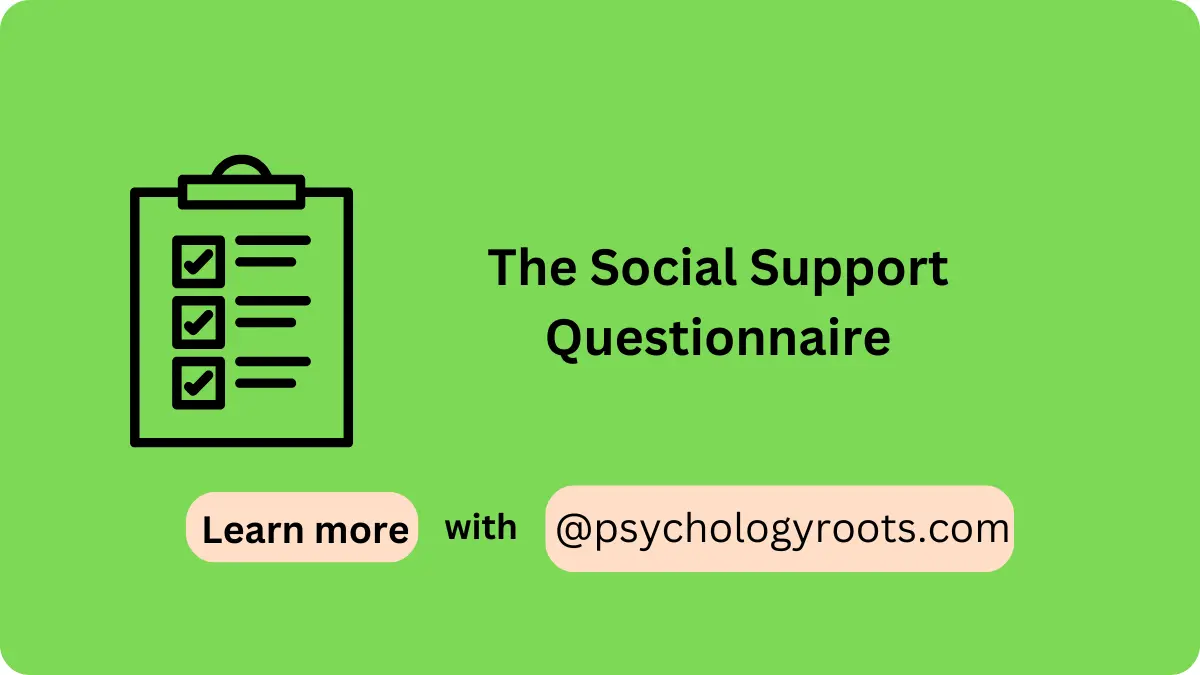Table of Contents
The Social Support Questionnaire
Here in this post, we are sharing the “The Social Support Questionnaire”. You can read psychometric and Author information. We have thousands of Scales and questionnaires in our collection (See Scales and Questionnaires). You can demand us any scale and questionnaires related to psychology through our community, and we will provide you with a short time. Keep visiting Psychology Roots.
About The Social Support Questionnaire
Scale Name
The Social Support Questionnaire
Author Details
Irwin G. Sarason
Translation Availability
English

Background/Description
The Social Support Questionnaire (SSQ), developed by Irwin G. Sarason in 1983, is a 27-item self-administered scale designed to quantify the availability of and satisfaction with social support in general population samples. Published in Journal of Personality and Social Psychology (1983), the SSQ is based on the premise that social support buffers stress, enhances adjustment, and promotes health. It focuses on two dimensions: the number of available support persons (SSQN, number score) and satisfaction with support (SSQS, satisfaction score). Each of the 27 items asks respondents to list up to nine individuals they can rely on for support in specific scenarios (e.g., emotional, practical) and rate satisfaction on a 6-point scale (1 = very dissatisfied, 6 = very satisfied). The SSQN is the mean number of support persons across items, and the SSQS is the mean satisfaction score.
The SSQ was validated with 105–602 adults (mean age ≈ 18–50 years, mixed gender, U.S.-based, primarily students), showing low correlation between SSQN and SSQS (r = 0.21–0.34), indicating distinct dimensions. It correlates negatively with depression (r = -0.22 to -0.43) and positively with optimism (r = 0.34–0.57). The SSQ is used in clinical psychology, public health, and stress research to assess social support’s role in health outcomes. Access requires permission from Journal of Personality and Social Psychology or the author.
Administration, Scoring and Interpretation
- Obtain the SSQ from Sarason et al. (1983) or authorized sources (e.g., Journal of Personality and Social Psychology), ensuring ethical permissions.
- Explain to participants (adults 18+ in general population) that the scale assesses available support and satisfaction, emphasizing confidentiality and voluntary participation.
- Administer the 27-item scale in a research or community setting via self-report, with an interviewer available to orient and prompt respondents to ensure all relevant relationships are considered.
- Estimated completion time is 10–15 minutes.
- Ensure a private, supportive environment; provide mental health resources (e.g., counseling services) and adapt for accessibility (e.g., oral administration for low literacy) if needed.
Reliability and Validity
The SSQ demonstrates strong psychometric properties (Sarason et al., 1983). Internal consistency is high (Cronbach’s alpha = 0.97 for SSQN, 0.94 for SSQS, N = 602). Inter-item correlations range from 0.35–0.71 (mean = 0.54) for SSQN and 0.21–0.74 for SSQS. Test-retest reliability over four weeks (N = 105) is robust (r = 0.90 for SSQN, 0.83 for SSQS), with longer-term correlations (2–36 months, N not specified) of 0.67–0.78 (SSQN) and 0.55–0.86 (SSQS).
Convergent validity is supported by correlations with parental support (r = 0.26–0.52), optimism (r = 0.34–0.57), and positive life events (r not specified). Discriminant validity is evidenced by negative correlations with depression (r = -0.22 to -0.43) and hostility (r < -0.20 for females), and low correlation with social desirability (r = 0.16–0.24). Factor analysis identifies a single factor per score (82% variance for SSQN, 72% for SSQS), confirming distinct dimensions. Criterion validity is shown by higher illness rates in low-support groups with negative life events (N = 163). Pairing with the Perceived Stress Scale or Social Relationship Scale enhances comprehensive assessment.
Available Versions
27-Items
Reference
Sarason, I. G., Levine, H. M., Basham, R. B., & Sarason, B. R. (1983). Assessing social support: the social support questionnaire. Journal of personality and social psychology, 44(1), 127.
Important Link
Scale File:
Frequently Asked Questions
What does the Social Support Questionnaire measure?
It measures the number of available support persons and satisfaction with support across 27 scenarios.
Who is the target population?
Adults (18+) in general population samples for stress and health research.
How long does it take to administer?
Approximately 10–15 minutes.
Can it inform interventions?
Yes, it assesses social support to guide stress management and mental health interventions.
Disclaimer
Please note that Psychology Roots does not have the right to grant permission for the use of any psychological scales or assessments listed on its website. To use any scale or assessment, you must obtain permission directly from the author or translator of the tool. Psychology Roots provides information about various tools and their administration procedures, but it is your responsibility to obtain proper permissions before using any scale or assessment. If you need further information about an author’s contact details, please submit a query to the Psychology Roots team.
Help Us Improve This Article
Have you discovered an inaccuracy? We put out great effort to give accurate and scientifically trustworthy information to our readers. Please notify us if you discover any typographical or grammatical errors.
Make a comment. We acknowledge and appreciate your efforts.
Share With Us
If you have any scale or any material related to psychology kindly share it with us at psychologyroots@gmail.com. We help others on behalf of you.